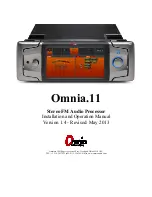
EDS-508A/505A Series User’s Manual
Featured Functions
3-44
STP Example
The LAN shown in the following figure has three segments, with adjacent segments connected
using two possible links. The various STP factors, such as Cost, Root Port, Designated Bridge Port,
and Blocked Port are shown in the figure.
Bridge A
LAN Segment 3
LAN Segment 2
LAN Segment 1
Port 2
(Root Bridge)
Port 1
(Designated
Bridge Port)
Bridge B
Port 2
(Designated
Bridge Port)
Port 1
(Root Port)
Cost =100
Bridge X
Port 2
(Blocked Port)
Port 1
(Root Port)
Cost =100
Bridge C
Port 2
(Designated
Bridge Port)
Port 1
(Root Port)
Cost =100
Bridge Y
Port 2
(Blocked Port)
Port 1
(Root Port)
Cost =200
Bridge A has been selected as the Root Bridge, since it was determined to have the lowest
Bridge Identifier on the network.
Since Bridge A is the Root Bridge, it is also the Designated Bridge for LAN segment 1. Port 1
on Bridge A is selected as the Designated Bridge Port for LAN Segment 1.
Ports 1 of Bridges B, C, X, and Y are all Root Ports sine they are nearest to the Root Bridge,
and therefore have the most efficient path.
Bridges B and X offer the same Root Path Cost for LAN segment 2. However, Bridge B was
selected as the Designated Bridge for that segment since it has a lower Bridge Identifier. Port 2
on Bridge B is selected as the Designated Bridge Port for LAN Segment 2.
Bridge C is the Designated Bridge for LAN segment 3, because it has the lowest Root Path Cost
for LAN Segment 3:
The route through Bridges C and B costs 200 (C to B=100, B to A=100)
The route through Bridges Y and B costs 300 (Y to B=200, B to A=100)
The Designated Bridge Port for LAN Segment 3 is Port 2 on Bridge C.
















































